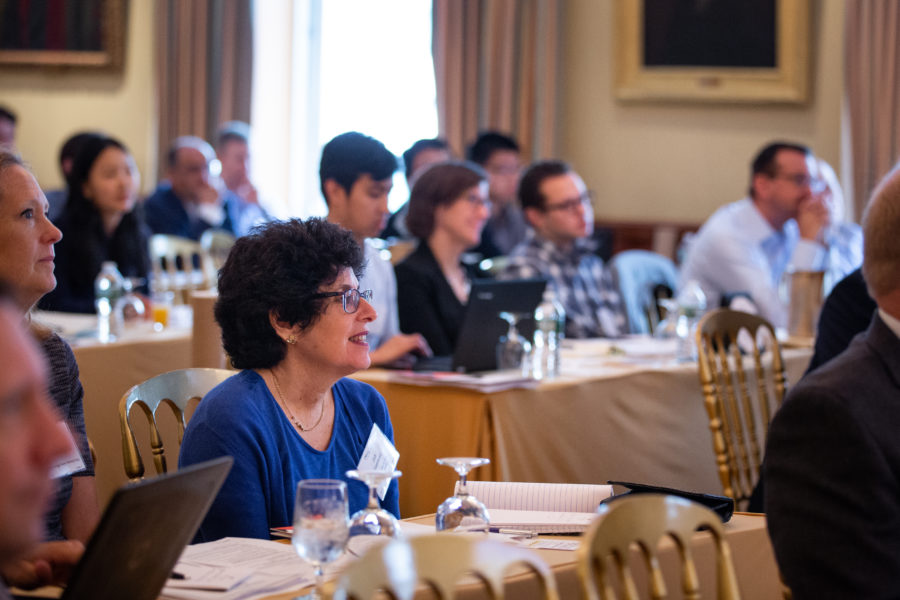By Molly A. Seltzer
When Judi Greenwald talks about her career, she is careful not to categorize herself.
“Everybody’s complicated and I think that’s good,” said Greenwald, the former deputy director for climate, environment and energy efficiency in the Department of Energy’s Office of Energy Policy and Systems Analysis. “In the dystopian movie Divergence, you’re either a soldier or a smart person or a nice person…. I’m divergent. I actively resist categorization,” said Greenwald.
Following a nearly four-decade career in energy and the environment, Greenwald, a Princeton alumna, returned to the University to connect technology innovation and environmental policy as one of two inaugural Gerhard R. Andlinger Visiting Fellows in Energy and the Environment last spring. She was excited to revisit her alma mater to “spend time with the thinkers” and get out of her comfort zone, in this case, the DC political scene.
“It’s important to push your own boundaries,” said Greenwald.
It is perhaps that openness and willingness to grow that propelled her career as a national leader in energy and climate solutions. Before joining the Obama administration in the Department of Energy, she served as the vice president of the Center for Climate and Energy Solutions, formerly the Pew Center on Global Climate Change, and in various governmental roles, including at the U.S. Environmental Protection Agency, the Nuclear Regulatory Commission and the U.S. Congress.
She earned a BSE from Princeton University’s School of Engineering and Applied Science in 1982 with an independent concentration in environmental engineering at a time when the school had yet to formalize the degree.

She is part of the first class of Gerhard R. Andlinger Visiting Fellows in Energy and the Environment, a new program designed to attract distinguished visitors from government, industry, non-profits and academia to broaden the impact and the expertise of the center. The visitors collaborate with Andlinger Center faculty, researchers, and students and use their experience working in the energy and environmental sectors to enrich the research and teaching of the center.
“I wanted to make stronger connections between teaching and research, and policymaking,” says Greenwald.
And connect she did. She collaborated with professors, such as Alain Kornhauser, to assess the environmental implications of autonomous vehicles, catalyzed research at the Energy Systems Analysis Group, and offered students exposure to leaders in the energy sector by supporting student events and bringing in speakers.
As the last formal act of her fellowship, Greenwald will foster dialogue on climate action this September with a free public conference about climate progress in the United States. “Accelerating Climate Action in the United States – What Are We Doing and What More Can be Done?” will take place Thursday, September 20, and Friday, September 21, 2018 at the Andlinger Center.
In line with Greenwald’s interdisciplinary approach to life and to addressing climate change, the forum will highlight how climate solutions rest at the intersection of technological innovation, public policy, market forces, and human behavior with a focus on the energy and transportation industries.
The event is the second major conference Greenwald has helped to organize at Princeton to bring together industry, government, and the academic community. In April she collaborated with the student group, Princeton University Energy Association (PUEA), on the conference “New Jersey’s Energy Future,” which took place on the same day that the New Jersey legislature voted to enact new incentives for nuclear and renewable power. She quickly addressed the changing policy landscape and explored the implications of the incentives in real-time with keynote speakers Ralph Izzo, president and CEO of PSEG, and Cheryl LaFleur, commissioner of the Federal Energy Regulatory Commission (FERC).
“That’s the beauty of having practitioners in house” says Yueh-Lin (Lynn) Loo, director of the Andlinger Center and the Theodora D. ’78 and William H. Walton III ’74 Professor in Engineering. “The Andlinger Center prides itself on being a convener of people who work in the field and fostering critical exchanges of ideas between practitioners and the scientific community. Judi embodies the purpose of the Visiting Fellows program.”
Greenwald also guest lectured at the Keller Center for Innovation in Engineering Education on career opportunities, at the Woodrow Wilson School of Public and International Affairs, and for student groups, such as CEREAL, Conversations on the Environment and Responsible Energy and Life.
Greenwald said that, at a time when the federal government is attempting to weaken environmental regulation, the academic space provided an opportunity for renewal, a place for her to both share her knowledge and find inspiration.
When asked about the most challenging aspect of the position, she spoke to her teaching role. She was quick to acknowledge that the hardest part was also the most inspiring.
“I met and interacted with smart, idealistic, and ambitious students who give me great hope for the future,” said Greenwald.
In the job of accelerating climate action, it might just be that optimism and interdisciplinary perspective that the moves the needle forward.
To join Judi, the Andlinger Center, and a list of distinguished speakers September 20th and 21st, register here. The conference is free and open to the public.
Featured speakers include:
Andrew Salzberg, Head of Transportation Policy and Research, Uber
David Armour, Chief City Executive, Siemens
Liz Lempert, Mayor, Princeton, New Jersey
David Crane, Former CEO, NRG Energy
Elke Weber, Professor in Energy and the Environment, Princeton University
The Gerhard R. Andlinger Visiting Fellows program provides an avenue for practitioners to engage with and contribute to the academic and research community. Learn more and apply to be part of the next cohort of Gerhard R. Andlinger Visiting Fellows by September 15, 2018.